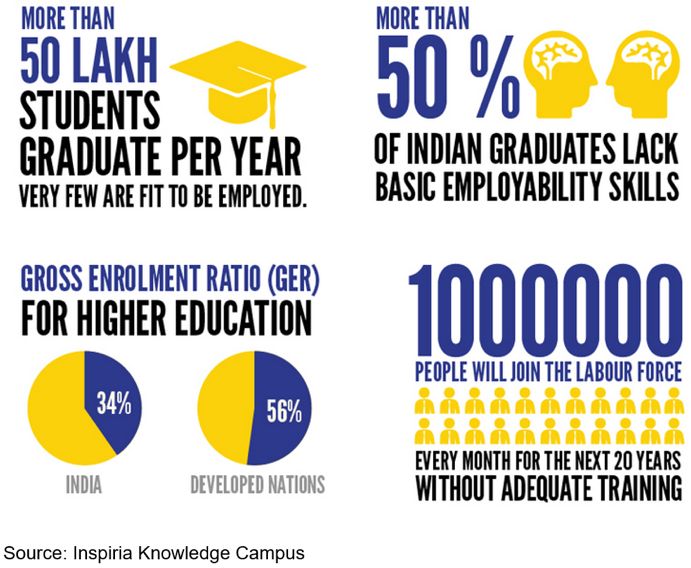Are we letting our youth down? It appears so. And the employer-youth disconnect is a key reason why.


The Indian mindset harbours a deep-set bias for a conventional higher education degree. The relevance of a bog-standard graduate degree has been steadily losing sheen if we consider how irrelevant a young person has become in relation to the actual skills needed to be good at a job. Why is there such a chasm (close to 75% some sources cite) between the supply and demand of skill?
State of Limbo
Our youth face an uphill task. Unable to find decent work, fresh graduates choose to study further, or are forced to take up jobs misaligned with their aspirations. And the competition can be crushing. Taking recent media reports as a case in point, close to 33% of 93,000 candidates who applied for 62 courier jobs in the police force in Uttar Pradesh held doctorate degrees.
Then there is the other side who remain unemployed in the hope of something better coming along, falling into the NEET (youth not in education, employment or training) trap. And the longer a young person remains outside of the formal workforce the more vulnerable they become to an uncertain career progression.
Why is this happening?
There are just not enough access routes for our youth into the workforce. With millions scrambling for the same jobs, with the same degrees, there is very little to differentiate between them.
Enter Apprenticeships
In the UK, to address similar problems of youth unemployability, a survey revealed that 73% of employers underscored a need for youth to have more access to real world of work. And apprenticeships epitomise the ‘skilling by doing’ approach to education.
The European Commission points to a “…long-standing and robust body of evidence [that] has consistently shown that countries with rigorous apprenticeship schemes, such as Germany, Austria, Switzerland…” are able to accomplish a smoother transition from education to work. And well-integrated apprenticeship systems have a significant effect on lowering NEET levels in youth.
Win-Win
In a recent Aspiring Minds survey, Indian employers stated a whopping 80% of engineering graduates (the crème de la crème of our education system) did not have the minimum requisite industry skills. The employers lay the blame squarely on lack of adequate industry experience which a culture of theory-heavy and rote-learning only exacerbates.
Employers increasingly seek candidates with work experience, but often do not realise that they themselves can do a lot more to provide that experience. Apprenticeships with their many all-immersive practical work experience characteristics become the perfect springboard for employers to take charge of the talent they value and for youth to acquire the skills employers seek.
Explaining how apprenticeships can become a winning differentiating factor, Joint Secretary from the MSDE, Rajesh Aggarwal, stated at a NETAP-IAF event, “Employers will promote apprenticeships in an area where there is a need for people and scope for employment. And the whole supply chain matching takes place at the apprenticeship stage.”
“The whole idea is that it is industry who know what is best for them. It is industry who know what are the competencies they are looking for, in their future workforce.”
Power of Employers
A simple engagement with an employer can have a transformational effect on youth. It has been found that young adults who interacted with employers while in education, are on average up to 20% less likely to fall into the NEET category, see an increase of around 18% in wages when they start working full-time, and are much more optimistic about their careers when compared to peers who have had minimum contact with employers.
Strong employer-youth engagement provides a crucial window to what employers expect- eliminating the mismatch between jobs and skills at ground zero level. And a long-term (1-3 years) apprenticeship experience is the front runner in building a robust talent pool for an employer’s future workforce.
“Few graduates have done internships or heard an industry talk and few professors discuss industry applications for the skills they teach,” elucidates Varun Aggarwal, cofounder of Aspiring Minds.v The effect of such gross disconnect can be catastrophic. “We found over 90% of engineering graduates are not even able to write ten lines of code,” Varun outlines.
Giving Apprenticeships a Chance
That’s all well and good, an employer may say. But how do I get access to youth in the first place? The mechanism exists today via the National Apprenticeship Promotion Scheme (NAPS) and the Apprentice Act which has undergone many industry-friendly amendments.
We encourage you to go through our guides:
- Getting an Apprenticeship Program Off the Ground – A Toolkit for Employers- Part I and Part II.
- For more on how to engage with youth read Engaging Employers Locally.














